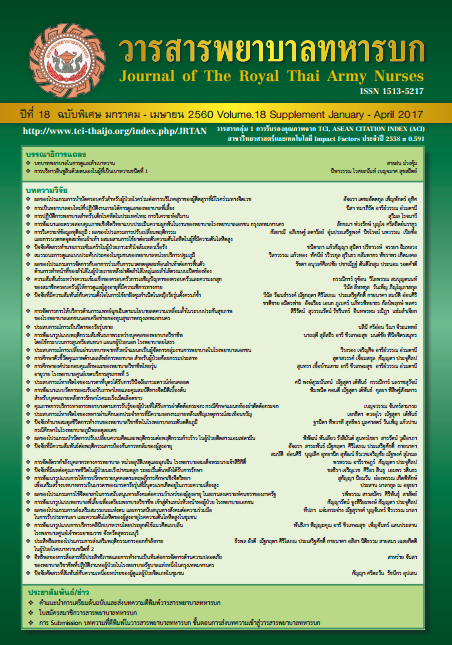ผลของโปรแกรมบำบัดการปรับเปลี่ยนความคิดและพฤติกรรมต่อพฤติกรรมก้าวร้าว ในผู้ป่วยติดสารแอมเฟตามีน
Keywords:
พฤติกรรมก้าวร้าว, ผู้ป่วยติดสารแอมเฟตามีน, การปรับเปลี่ยนความคิดและพฤติกรรม, aggressive behavior, patient with amphetamine dependence, cognitive behavior therapyAbstract
การวิจัยครั้งนี้เป็นการวิจัยกึ่งทดลอง มีวัตถุประสงค์เพื่อเปรียบเทียบคะแนนเฉลี่ยพฤติกรรมก้าวร้าวในผู้ป่วยติดสารแอมเฟตามีนของกลุ่มทดลอง ก่อนและหลังได้รับโปรแกรมบำบัดการปรับเปลี่ยนความคิดและพฤติกรรม และเปรียบเทียบคะแนนเฉลี่ยพฤติกรรมก้าวร้าวในผู้ป่วยติดสารแอมเฟตามีน ระหว่างกลุ่มทดลองและกลุ่มควบคุม หลังการได้รับโปรแกรมบำบัดการปรับเปลี่ยนความคิดและพฤติกรรม กลุ่มตัวอย่างคือผู้ป่วยติดสารแอมเฟตามีนที่เข้ารับการบำบัดรักษาในโรงพยาบาลระดับตติยภูมิ อายุ 18-59 ปี จำนวน 62 คน แบ่งเป็นกลุ่มทดลองและกลุ่มควบคุม กลุ่มละ 31 คน กลุ่มทดลองได้รับโปรแกรมบำบัดการปรับเปลี่ยนความคิดและพฤติกรรม จำนวน 6 สัปดาห์ ๆ ละครั้งๆ ละ 1-1.5 ชั่วโมง กลุ่มควบคุมได้รับการพยาบาลตามปกติ รวบรวมข้อมูลโดยแบบประเมินพฤติกรรมก้าวร้าว ค่าความเชื่อมั่นเท่ากับ .9 วิเคราะห์โดยใช้สถิติทดสอบค่าทีผลการศึกษาพบว่า คะแนนเฉลี่ยพฤติกรรมก้าวร้าวของผู้ป่วยติดสารแอมเฟตามีนในกลุ่มทดลอง หลังได้รับโปรแกรมบำบัดการปรับเปลี่ยนความคิดและพฤติกรรม (M = 3.23, SD = .67) ต่ำกว่าคะแนนเฉลี่ยพฤติกรรมก้าวร้าวก่อนทดลอง (M = .23, SD =.56) อย่างมีนัยสำคัญทางสถิติ (p<.001, t = 20.457) และคะแนนเฉลี่ยพฤติกรรมก้าวร้าวของผู้ป่วยติดสารแอมเฟตามีนในกลุ่มทดลอง หลังได้รับโปรแกรมบำบัดการปรับเปลี่ยนความคิดและพฤติกรรม มีคะแนนเฉลี่ยพฤติกรรมก้าวร้าว (M = .23, SD = .56) ต่ำกว่ากลุ่มควบคุม (M =3.23, SD =.50) ที่ได้รับการพยาบาลตามปกติอย่างมีนัยสำคัญทางสถิติ (p<.001, t = 22.295) สรุป บุคลากรทางวิชาชีพสุขภาพสามารถประยุกต์โปรแกรมบำบัดการปรับเปลี่ยนความคิดและพฤติกรรมในการบำบัดเพื่อลดพฤติกรรมก้าวร้าวในผู้ป่วยติดสารแอมเฟตามีนได้อย่างมีประสิทธิผล
The Effects Of A Cognitive Behavior Therapy Program On The Aggressive Behaviors Among Patients With Amphetamine Dependence
This quasi-experimental research used a pretest-posttest control group design. The purposes of this study were: to compare the aggressive behavior scores of amphetamine-dependent patients in the experimental group before and after participating in the cognitive behavior therapy program; and to compare the aggressive behavior scores of the amphetamine-dependent patients between the experimental and control groups after participating in the cognitive behavior therapy program. The samples were amphetamine-dependent patients that were under the amphetamine treatment at a tertiary care hospital, aged 18-59 years. The sixty-two patients were divided into the experimental and control group, 31 in each group. The experimental group participated in the cognitive behavior therapy program for 6 weeks, 1-1.5 hour/session/week. The control group received the regular nursing intervention. An overt aggressive scale (OAS) was used as the tool to collect the data regarding the participants’ aggressive behavior. The reliability of this tool was .9. Data were analyzed using descriptive statistics and t-test. According to the finding in the experimental group, the mean score for the aggressive behavior of the patients with amphetamine dependence after participating in the cognitive behavior therapy program (M = 3.23, SD = .67) was statistically significantly lower than the mean score after participating in the group therapy (M = .23, SD =.56) (p<.001, t = 20.457). Furthermore, The mean score of the aggressive behavior of the patients with amphetamine dependence in the experimental group after participating in the cognitive behavior therapy program (M = .23, SD = .56) was statistically significantly lower than that in the control group (M =3.23, SD =.50) (p<.001, t = 22.295). In conclusion, the health professional providers applied the cognitive behavior therapy program to effectively reduce the aggressive behavior in patients with amphetamine dependence.
Downloads
Downloads
How to Cite
Issue
Section
License
บทความหรือข้อคิดเห็นใดใดที่ปรากฏในวารสารพยาบาลทหารบกเป็นวรรณกรรมของผู้เขียน ซึ่งบรรณาธิการหรือสมาคมพยาบาลทหารบก ไม่จำเป็นต้องเห็นด้วย
บทความที่ได้รับการตีพิมพ์เป็นลิขสิทธิ์ของวารสารพยาบาลทหารบก
The ideas and opinions expressed in the Journal of The Royal Thai Army Nurses are those of the authors and not necessarily those
of the editor or Royal Thai Army Nurses Association.






